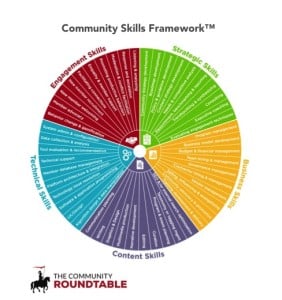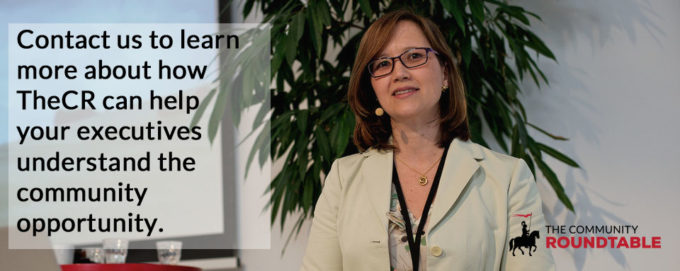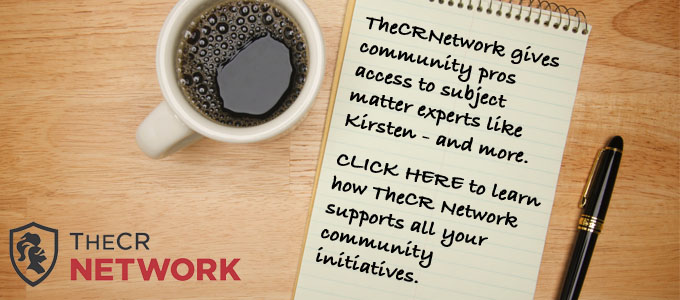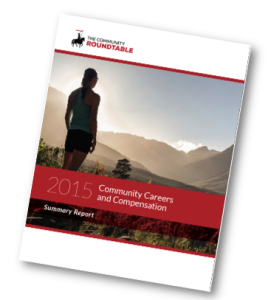Happy Community Manager Appreciation Day, everyone! We enjoy CMAD as a chance to recognize the hard work thousands of community professionals do every day. But thank yous don’t pay the bills. That’s why this year for CMAD, we wanted to see how salaries for community professionals were trending.
So we seized on a unique opportunity.
In November, we reached out to a group of community pros for whom we already had a lot of data – the 403 respondents to our Community Careers and Compensation 2015 survey. We asked them for five minutes of their time, to update us on their salary and career path. It was a challenge – people who have moved around change email addresses, others decline to be contacted, and others don’t take part. When all was said and done, though, we had gotten year-over-year updates from more than 110 community professionals. The great news is captured in our new infographic.
Salaries for experienced community managers are rising. Sharply.
Quality community professionals are in high demand, and that means higher salaries. Salaries and bonuses for our survey group jumped an average of almost 10 percent between 2015 and 2016. Some folks boosted their income by changing jobs or roles. Others got raises by proving their value. The bottom line was this – the average community manager compensation in our sample approached $80,000. Community strategists and community directors are regularly earning over $100,000. Those numbers won’t hold true for everyone in every industry, but the broad trend of rising salaries was clear and pretty consistent across use cases and community types.
The average community manager compensation in our sample approached $80,000. Community strategists and community directors are regularly earning over $100,000.
Community pros are a mobile bunch.
One way to boost your salary is to change jobs, and community professionals live that fact. One in four survey respondents changed organizations from 2015 to 2016. Some were merged or acquired into new roles, but most made the leap on their own.
And they’re moving UP.
Community managers, in particular, aren’t just moving around – they’re moving up into management. About 20% of our respondents who defined themselves as community managers in 2015 had risen to a strategist or director role in 2016. And across the board, our sample was reporting to higher levels of their organizations. Forty-five percent of the overall sample said they reported to a Vice President, Senior VP or C-level manager, up from 36 percent in 2015.
Other high-level trends:
There are a few other trends that were in evidence, but not strong enough to be statistically sound. They’re all on my list for the next full Community Careers and Compensation survey!
- Geography: Our coastal respondents, particularly those on the West Coast, saw the highest salary spikes, which could suggest high demand. We saw positive salary trends in every region, though.
- Experience/Community Size: There was no evident correlation between salary change and years of experience or community size.
- Industry: High tech and software community pros got the biggest bump in our sample, but neither the difference or the sample size was enough for us to send people running into the tech sector for a big raise.
Enjoy and share the infographic – and happy Community Manager Appreciation Day! You deserve it.

Download the infographic.
Looking for more resources to help you in your community career?
- How Do I Find a Community Manager Job? – Community management is a profession of relationships – use your network to discover your next role. Most community jobs are not currently found through traditional job listings.
- 50 Skills of Community Management – The Community Skills Framework represents the five skill families and top 50 skills that are required to build a successful community program.
- How To Win That Community Manager Job – As organizations begin to increasingly recognize and reward the value of good community management the market for jobs has begun to heat up. While at any given moment there are literally dozens of interesting community jobs open around the country (and truly, the world) the competition for these roles is getting stiffer. How can you set yourself apart?
- 8 Tips for Being a Successful Remote Worker – With so many work-from-home/remote community jobs out there, we’ve shared some helpful tips to succeed in this environment. It’s not as easy and glamorous as you’d think!
-
For TheCR Network Eyes Only: Community Careers and Development Group – Are you a member of TheCR Network? Check out this group inside TheCR Network where members share job postings, hiring advice and best practices for landing the community jobs of your dreams!




 spoiler: it’s not just the free PBR and office foosball tables that make it such a good option.
spoiler: it’s not just the free PBR and office foosball tables that make it such a good option. 2-Hour Commute? No Thanks.
2-Hour Commute? No Thanks. What are the most valuable skills for a community manager? What is the career path? And how much can one make? Those are among the key questions being answered in the
What are the most valuable skills for a community manager? What is the career path? And how much can one make? Those are among the key questions being answered in the 